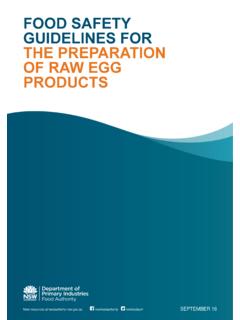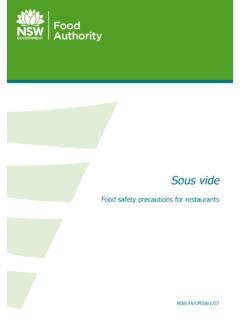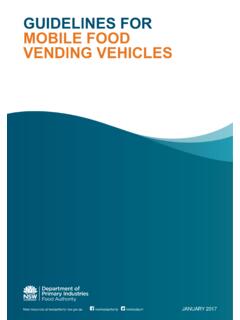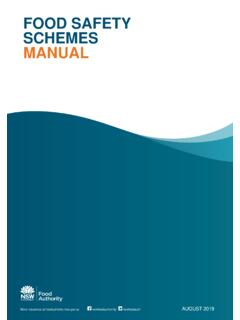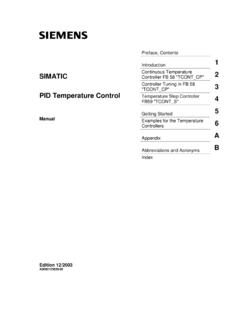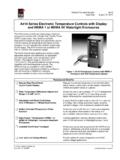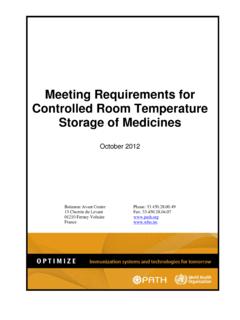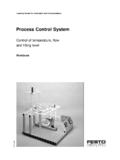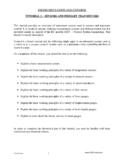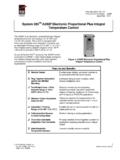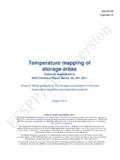Transcription of 4-HOUR / 2-HOUR RULE - NSW Food Authority
1 More resources at nswfoodauthority nswfoodauth Temperature control is very important to prevent harmful bacteria from growing in food. Food businesses should minimise the time that food spends in the so-called temperature danger zone to keep food safe. This means cold food should be kept at 5 C or below and hot food should be kept at 60 C or above (see diagram below). However, because bacteria can take time to grow to high enough numbers to cause food poisoning, the Food Standards Code provides an alternative method for temperature control that allows food businesses to hold food between 5 C and 60 C, but only for short and measured periods of time.
2 What is the 4-HOUR / 2-HOUR rule? Studies show that food can be safely held out of temperature control for short periods of time without significantly increasing the risk of food poisoning. The time that food can be safely held between 5 C and 60 C is referred to as the 4-HOUR / 2-HOUR rule (see diagram): Food that has been in the temperature danger zone for less than 2 hours (including preparation, storage and display) can be returned to the refrigerator to below 5 C, or heated to above 60 C and brought out again at a later time. However, the total time in the temperature danger zone must not be longer than 4 hours.
3 Using the 4-HOUR / 2-HOUR rule correctly If a food business decides to use the 4-HOUR / 2-HOUR rule, there are certain Food Standards Code requirements that must be met. The business must be able to demonstrate compliance with these requirements if asked by an authorised officer from the NSW Food Authority or a council Environmental Health Officer. To demonstrate the 4-HOUR / 2-HOUR rule is being applied correctly, food businesses must: ensure the requirements for potentially hazardous food (PHF) and ingredients are followed during: receival storage 4-HOUR / 2-HOUR RULE 0 to 2 hours Use immediately or keep at 5 C or below or at 60 C or above 2 to 4 hours Use immediately More than 4 hours Throw away More resources at nswfoodauthority nswfoodauth preparation.
4 Ensure cold foods are not displayed in direct sunlight or at temperatures above 25 C, as this will allow bacteria to quickly increase in numbers. implement a documented system for: monitoring the length of time food is displayed out of temperature control ensuring the food is appropriately identified ensuring food is disposed of appropriately after 4 hours. The documented system can take the form of: a set of work instructions on how the 4-HOUR / 2-HOUR rule is applied by the business (see Appendix 1 of Guidance on the 4-HOUR / 2-HOUR rule), OR keeping records that demonstrate adherence to the time temperature requirements (see Appendix 2 of Guidance on the 4-HOUR / 2-HOUR rule).
5 If a food business decides to use the 4-HOUR / 2-HOUR rule for temperature control but are not able to satisfactorily demonstrate they are applying the 4-HOUR / 2-HOUR rule correctly, the business may be found to be in breach of the Food Standards Code, which can lead to enforcement action. It is the responsibility of food business to make sure all food handlers understand the use of the 4-HOUR / 2-HOUR rule and complete the appropriate records. More information This information is a general summary and cannot cover all situations. Food businesses are required to comply with all of the provisions of the Food Standards Code and the Food Act 2003 (NSW).
6 For more: visit the NSW Food Authority s website at phone the helpline on 1300 552 406 see the Guidance on the 4-HOUR / 2-HOUR rule. About the NSW Food Authority : The NSW Food Authority is the government organisation that helps ensure NSW food is safe and correctly labelled. It works with consumers, industry and other government organisations to minimise food poisoning by providing information about and regulating the safe production, storage, transport, promotion and preparation of food. Note: This information is a general summary and cannot cover all situations. Food businesses are required to comply with all of the provisions of the Food Standards Code and the Food Act 2003 (NSW).
7 6 Avenue of the Americas, Newington NSW 2127 PO Box 6682, Silverwater NSW 1811 T 1300 552 406 ABN 47 080 404 416 More resources at nswfoodauthority nswfoodauth January 2018 NSW/FA/FI128/1803


